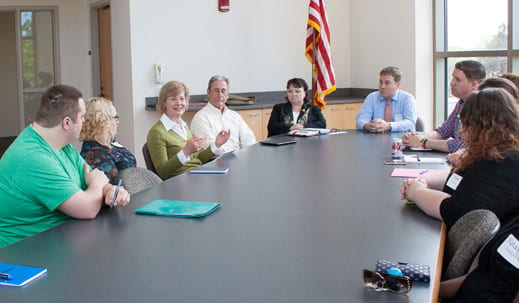Sen. Baldwin talks debt with students, alumni during campus visit

About a dozen UW-Green Bay students and alumni met Wednesday (May 28) with U.S. Sen. Tammy Baldwin, participating in a roundtable discussion on the issue of student debt.
Flanked by Chancellor Tom Harden and students with experiences to share, Baldwin spoke about the causes of the rising student debt burden in the United States, as well as legislation she’s co-sponsoring that would allow those with outstanding student debt loan to refinance at lower interest rates.
“Over the past decade, student debt has tripled in America,” Baldwin said. “Behind all of those dollars, all of those loans, are individual stories.”
Baldwin devoted most of her time during the session to hearing those stories, as attendees shared thoughts on financial challenges as well as determination to succeed.
“It’s the best debt that I have — I’m proud of that debt,” said Kari Moody, a 2000 UW-Green Bay graduate who is now the school’s Alumni Relations Director. “But it’s scary to me that I have an 8-year-old and we haven’t started saving for her college education yet.”
Moody will finish paying her loans back next year, she said, and then her family can start college savings accounts for her three young children.
For Patrick Gray, a Master of Management student who has paid off most of his undergraduate debt, rising interest rates have been a challenge.
“It really struck me,” he said. “The loans I took 10 years ago were like three-and-a-quarter percent (interest rate). Now it’s more like seven (percent).”
Other students talked about the challenges of balancing work, school, family and other obligations, while some mentioned the challenges of filling out the Free Application for Federal Student Aid (FAFSA) — a particular issue, in many cases, for first-generation college students whose families haven’t dealt with the form before.
UW-Green Bay has a high percentage of first-generation college students, Harden said, and although parents want to be supportive, they don’t always know how best to help. Students may not fully understand the ramifications of the amount they borrow, several participants said.
“When you’re 18,” Harden said, “paying off a loan years from now can seem like another lifetime.”
(Click thumbnails to enter slideshow view.)

























— Photos by Kimberly Vlies, Office of Marketing and University Communication
College debt is a concern even at UW-Green Bay, where financial aid counselors have observed that students tend to be conservative about borrowing for their education. And according to a 2013 federal College Scorecard report UW-Green Bay students enjoy the lowest net costs of any 4-year university, public or private, in Wisconsin.
The College Scorecard, issued by the U.S. Department of Education, was announced by President Barack Obama in January 2013, when he promised an independent way to spotlight schools that deliver positive results at an affordable price.
The Scorecard is primarily based on price, student debt and graduation outcomes. It determines net cost by subtracting grant and scholarship awards from total tuition, fees and room and board.
Tuition and fees for a Wisconsin resident attending UW-Green Bay full time are $7,676 annually, with a tuition freeze this year and next. Because UW-Green Bay enrolls a somewhat higher percentage of first-generation college students and those from low- and moderate-income households, students here are relatively more likely to receive federal aid to offset costs.
Also contributing to UW-Green Bay’s top ranking are a competitive graduation rate, moderate charges for housing and food plans, and a median debt figure of $13,580, well below average and the lowest among UW System institutions. (The scorecard calculates “median borrowing” by tracking federal education loans and assigning them to the schools at which they were incurred.) Only 4.2 percent of UW-Green Bay borrowers defaulted on their student loans within three years of repayment, one-third the national average. You can browse the College Scorecard at www.whitehouse.gov/issues/education/higher-education/college-score-card.


